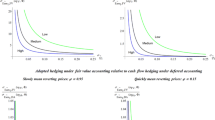Abstract
We report that firms reversing impairments under IAS 36 are not more incentivized to engage in earnings management and do not actually engage in more earnings management than a control sample matched on size and industry. We observe that reversals are positively associated with stock market valuation changes but not with future operating performance. Bifurcating our reversal firms into earnings managers and other firms, we report that the impairment reversals of the latter are positively associated with future firm performance and current stock market returns, while those of the former are negatively associated with future operating performance and are unrelated to stock valuation. Thus, while on average impairment reversals are undertaken in an unbiased manner, a minority of firms exploit the latitude provided by this fair value accounting standard to manage earnings upward. This research provides useful information to accounting standard setters pertaining to the adoption of fair value accounting methods. It also assists investment analysts by demonstrating how to detect opportunistic reversals of impairments.
Similar content being viewed by others
Notes
No firm appears in the control sample twice in the same year.
References
Aboody, D., M.E. Barth, and R. Kasznik. 1999. Revaluations of fixed assets and future firm performance: Evidence from the UK. Journal of Accounting and Economics 26 (1–3): 149–178.
Alciatore, M., C.C. Dee, P. Easton, and N. Spear. 1998. Assets write-downs: A decade of research. Journal of Accounting Literature 17: 1–3.
Barth, M.E., W.R. Landsman, and M.H. Lang. 2008. International accounting standards and accounting quality. Journal of Accounting Research 46 (3): 467–498.
Bernard, V. 1993. Discussion of an investigation of revaluations of tangible long-lived assets. Journal of Accounting Research 31: 39–45.
Chen, S., Y. Wang, and Z. Zhao. 2009. Evidence of asset impairment reversals from China: Economic reality or earnings management. Journal of Accounting, Auditing and Finance 24 (4): 589–620.
Dechow, P.M. 1994. Accounting earnings and cash flows as measures of firm performance: The role of accounting accruals. Journal of Accounting and Economics 18: 3–42.
DeFond, M.L., and C.W. Park. 2001. The reversal of abnormal accruals and the market valuation of earnings surprises. The Accounting Review 76 (3): 375–404.
Duh, R.R., W.C. Lee, and C.C. Lin. 2009. Reversing an impairment loss and earnings management: The role of corporate governance. The International Journal of Accounting 44 (2): 113–137.
Easton, P.D., P.H. Eddey, and T.S. Harris. 1993. An investigation of revaluations of tangible long-lived assets. Journal of Accounting Research 31: 1–38.
Emanuel, D.M. 1989. Asset revaluations and share price revisions. Journal of Business Finance and Accounting 16 (2): 213–227.
Fama, E., and K. French. 1992. The cross-section of expected returns. Journal of Finance 47 (2): 427–463.
Francis, J., J.D. Hanna, and L. Vincent. 1996. Causes and effects of discretionary assets write-offs. Journal of Accounting Research 34: 117–134.
Healy, P., and J. Wahlen. 1999. A review of the earnings management literature and its implications for standard setting. Accounting Horizons 13 (4): 365–383.
Hribar, P., and C. Nichols. 2007. The use of unsigned earnings quality measures in tests of earnings management. Journal of Accounting Research 45 (5): 1017–1053.
Jordan, C.E., and S.J. Clark. 2004. Big bath earnings management: The case of goodwill impairment under SFAS no 142. Journal of Applied Business Research 20 (2): 63–69.
Lang, M., J.S. Raedy, and W. Wilson. 2006. Earnings management and cross listing: Are reconciled earnings comparable to US earnings? Journal of Accounting and Economics 42 (1–2): 255–283.
Leuz, C., D. Nanda, and P. Wysocki. 2003. Earnings management and investor protection: An international comparison. Journal of Financial Economics 69 (3): 505–527.
Malaysian Accounting Standard Board (MASB). 2005. Financial reporting standard 136 impairment of assets. Kuala Lumpur: MASB.
Ohlson, J.A. 1995. Earnings, book values, and dividends in equity valuation. Contemporary Accounting Research 11: 661–687.
Riedl, E.J. 2004. An examination of long-lived asset impairment. The Accounting Review 79 (3): 823–852.
Sevin, S., and R. Schroeder. 2005. Earnings management: Evidence from SFAS no. 142 reporting. Managerial Auditing Journal 20 (1): 47–54.
Sharpe, I.G., and R.G. Walker. 1975. Asset revaluations and stock market prices. Journal of Accounting Research 13 (2): 293–310.
Titard, P.L., and D.B. Pariser. 1996. Impaired assets: Meeting users’ information needs. Journal of Accountancy 182 (6): 55–56.
Zhang, R., Z. Lu, and K. Ye. 2010. How do firms react to the prohibition of long-lived asset impairment reversals? Evidence from China. Journal of Accounting and Public Policy 29: 424–438.
Acknowledgements
We gratefully acknowledge helpful comments and suggestions from Len Skerratt.
Author information
Authors and Affiliations
Corresponding author
Rights and permissions
About this article
Cite this article
Shaari, H., Cao, T. & Donnelly, R. Reversals of impairment charges under IAS 36: evidence from Malaysia. Int J Discl Gov 14, 224–240 (2017). https://doi.org/10.1057/s41310-017-0022-y
Revised:
Published:
Issue Date:
DOI: https://doi.org/10.1057/s41310-017-0022-y



